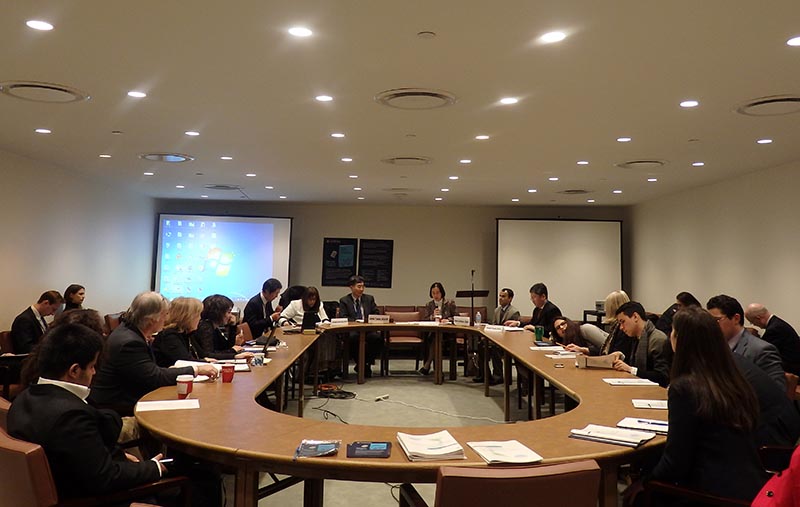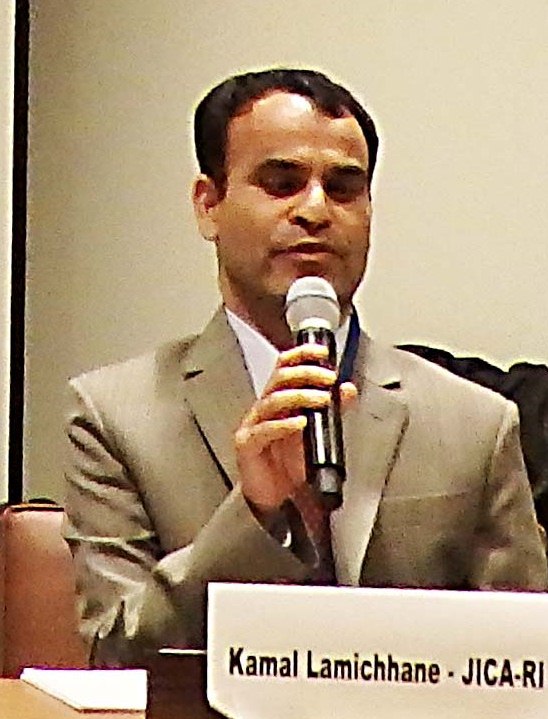Investing in Education of Persons with Disabilities: JICA-RI Research Fellow Kamal Lamichhane Presents his Book on the International Day of Persons with Disabilities
2014.12.11
JICA-RI Research Fellow Kamal Lamichhane has written the book entitled Disability, Education and Employment in Developing Countries: From Charity to Investment, which will be published by Cambridge University Press by the end of December, 2014. This book for the first time brings together interdisciplinary studies on the connections and relationships between disability, education and employment in low and middle income countries and provides new insights into the importance of investing in people with disability. On the occasion of 23rd International Day of Persons with Disabilities, December 3rd, JICA-RI and the Department of Economic and Social Affairs of the United Nations (UN-DESA), the United Nations Development Programme (UNDP) and the United Nations University (UNU) jointly organized a programme to launch this book at the United Nations Headquarter.

At the launching event
Within the context of the quickly approaching 2015 deadline to achieve the United Nations Millennium Development Goals (MDGs), there have been active discussions on the post-2015 development agenda. Throughout this process, ensuring the inclusion of persons with disabilities has been a critical issue in the international community. The data and empirical research on the issue has been limited even though persons with disabilities make up 15% of the world’s population and 80% of them are said to live in developing countries.
Based on empirical data from developing countries including Nepal, India, Bangladesh, Cambodia, and the Philippines, Lamichhane has conducted research that systematically analyzes the relationships between disability, education, and employment. He presented the main finding of the book, highlighting that investments in human capital, particularly education and employment, are some of the most important factors in promoting both social inclusion and economic empowerment. When education and labor markets are made inclusive and accessible to persons with disabilities, not only does their livelihood improve, so do the prospects of their families and society as a whole.

Kamal Lamichhane
Following Lamichhane’s presentation, Yasuyuki Sawada, Professor at the Graduate school of Economics, the University of Tokyo (JICA-RI Visiting Fellow); Rosangela Berman Bieler, Chief Disability Section, Programme Division of the United Nations Children’s Fund (UNICEF); and Akiko Ito, Chief of the Secretariat for the Convention on the Rights of Persons with Disabilities at UN-DESA, discussed the policy implication of the book. It was noted that the book contributes largely to post-2015 debate in setting meaningful goal by providing reliable statistics and empirical evidences on disability. The discussants also commended the outstanding achievement that book brings for the first time extant empirical research on the returns to the investment in education of persons with disabilities. At the same time, speakers also stated the need of further research in other countries applying the analytical framework adopted in the book.
In addition to the book launch event, Lamichhane also participated as a panelist in a panel discussions including “Disability-Inclusive Sustainable Development Goals” hosted by UN-DESA. During the discussion, panelists exchanged their views on how technology promotes the social participation of persons with disabilities, as well as specific policies and practical initiatives on the topic. Lamichhane pointed out that many of the persons with disabilities living in developing countries have limited access to technology due to poverty, and that the application of universal design will benefit them without additional cost.

事業事前評価表(地球規模課題対応国際科学技術協力(SATREPS)).国際協力機構 地球環境部 . 防災第一チーム. 1.案件名.国 名: フィリピン共和国.

事業事前評価表(地球規模課題対応国際科学技術協力(SATREPS)).国際協力機構 地球環境部 . 防災第一チーム. 1.案件名.国 名: フィリピン共和国.

事業事前評価表(地球規模課題対応国際科学技術協力(SATREPS)).国際協力機構 地球環境部 . 防災第一チーム. 1.案件名.国 名: フィリピン共和国.

事業事前評価表(地球規模課題対応国際科学技術協力(SATREPS)).国際協力機構 地球環境部 . 防災第一チーム. 1.案件名.国 名: フィリピン共和国.

事業事前評価表(地球規模課題対応国際科学技術協力(SATREPS)).国際協力機構 地球環境部 . 防災第一チーム. 1.案件名.国 名: フィリピン共和国.
scroll